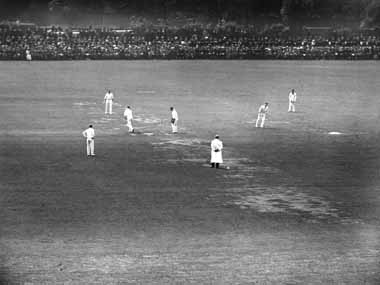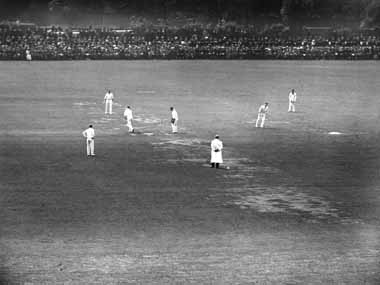It’s ironic that in an era of shrinking limited-overs formats and shorter memory spans comes a suggestion that a Test match could be played with no time limit, to determine a winner. The match in question is the final of the World Test Championship, to be held in England in 2013. The last ‘timeless’ Test was played just before the outbreak of World War II, between South Africa and England in Durban which went on for nine days and, believe it or not, still wasn’t enough to produce a result. All because the boat carrying the England players home couldn’t wait any longer. Clearly, the ICC is anxious that its latest showpiece event, the first of its kind in Tests, produces an outright winner. Nothing is set in stone yet. Logistics and financial implications of holding a timeless Test still have to be worked out. The product has to be appetising enough for sponsors, broadcasters, players and the fans before giving the green signal. There’s always something romantic about reviving an old tradition to see how it succeeds in a more contemporary environment. But will the revival of the ‘timeless’ Test, after 74 years, spark any enthusiasm? The simple answer is ‘no’. The game’s governing body has come under fire recently for some bizarre decisions, such as the participation of Associate countries in major world tournaments and further tinkering with the rules of the game. The sustainability of Test cricket in the midst of the Twenty20 revolution is among their list of worries. They have gone at lengths to stress that Tests are still the game’s pinnacle, and that is something all fans alike will agree with. [caption id=“attachment_45071” align=“alignleft” width=“380” caption=“England v Australia at the Oval, second day 3rd Test. Ernest James Smith known as Tiger Smith (England) being clean bowled by William James Whitty known as Bill Whitty. Topical Press Agency/Getty Images”]
 [/caption] The ICC mooted the Test Championship ages ago, but for reasons known best to them, it was forever in limbo and perennially a non-starter. Now it appears as if it’s finally taking shape. It’s a novel concept, designed to give the game’s oldest format more context and encourage players to play for more than just rankings. It consists of the top four teams in the rankings competing in semi-finals and a final. But if the ICC is intent on promoting the Test cricket brand, proposing a ‘timeless’ Test borders on the ridiculous. The team batting first may be tempted to score as much as the pitch will allow. Personal milestones may take precedence over the team’s cause. Centuries galore. How can the organisers expect to put bums on the seats in such a scenario? It’s obvious that in this day and age, fans simply don’t have enough time. Period. That explains the popularity of Twenty20. There are other ways of promoting the popularity of Test cricket. Spicing up the pitches is perhaps the best way. An even contest between bat and ball makes the game all the more absorbing and will compel people to walk through the turnstiles. A seven-day Test won’t. Given that the Test is proposed for the early summer in England, the ICC is anxious about the weather holding sway. But damp conditions will give the bowlers a greater say and hence increase the chances of a result. Perhaps the concept of getting first-innings points, adopted in first-class cricket, is the best solution in case of a draw. We’ve seen in domestic cricket that the race for points have produced some compelling contests. The suggestion of a timeless Test is indicative of the sense of insecurity the ICC has about Tests itself. A couple of years ago, Lorgat’s predecessor Malcolm Speed mooted the idea of four-day Tests. Floodlit Tests and pink balls were also talked about. Now a Test with no fixed end. No middle ground. Administrations may change, but confusion always prevails. What do the players feel? England offspinner Graeme Swann summed it up in the way he knows best: “We get enough stick from Americans who come over and say, ‘my God you play for five days and no result? You’ve got to be crazy!’ For the sake of the game, let’s hope the ‘timeless’ Test never sees the light of day. Otherwise, the ICC will miss the boat.
[/caption] The ICC mooted the Test Championship ages ago, but for reasons known best to them, it was forever in limbo and perennially a non-starter. Now it appears as if it’s finally taking shape. It’s a novel concept, designed to give the game’s oldest format more context and encourage players to play for more than just rankings. It consists of the top four teams in the rankings competing in semi-finals and a final. But if the ICC is intent on promoting the Test cricket brand, proposing a ‘timeless’ Test borders on the ridiculous. The team batting first may be tempted to score as much as the pitch will allow. Personal milestones may take precedence over the team’s cause. Centuries galore. How can the organisers expect to put bums on the seats in such a scenario? It’s obvious that in this day and age, fans simply don’t have enough time. Period. That explains the popularity of Twenty20. There are other ways of promoting the popularity of Test cricket. Spicing up the pitches is perhaps the best way. An even contest between bat and ball makes the game all the more absorbing and will compel people to walk through the turnstiles. A seven-day Test won’t. Given that the Test is proposed for the early summer in England, the ICC is anxious about the weather holding sway. But damp conditions will give the bowlers a greater say and hence increase the chances of a result. Perhaps the concept of getting first-innings points, adopted in first-class cricket, is the best solution in case of a draw. We’ve seen in domestic cricket that the race for points have produced some compelling contests. The suggestion of a timeless Test is indicative of the sense of insecurity the ICC has about Tests itself. A couple of years ago, Lorgat’s predecessor Malcolm Speed mooted the idea of four-day Tests. Floodlit Tests and pink balls were also talked about. Now a Test with no fixed end. No middle ground. Administrations may change, but confusion always prevails. What do the players feel? England offspinner Graeme Swann summed it up in the way he knows best: “We get enough stick from Americans who come over and say, ‘my God you play for five days and no result? You’ve got to be crazy!’ For the sake of the game, let’s hope the ‘timeless’ Test never sees the light of day. Otherwise, the ICC will miss the boat.
Kanishkaa Balachandran realised early enough that he was interested in little else besides cricket. After getting a Commerce degree, common sense prevailed when he joined Cricinfo, where he worked for more than four years as a journalist. He is currently finishing his Masters degree in Print Journalism at the University of Sheffield.
)